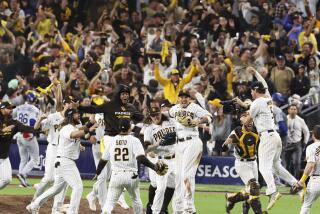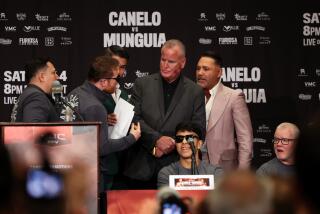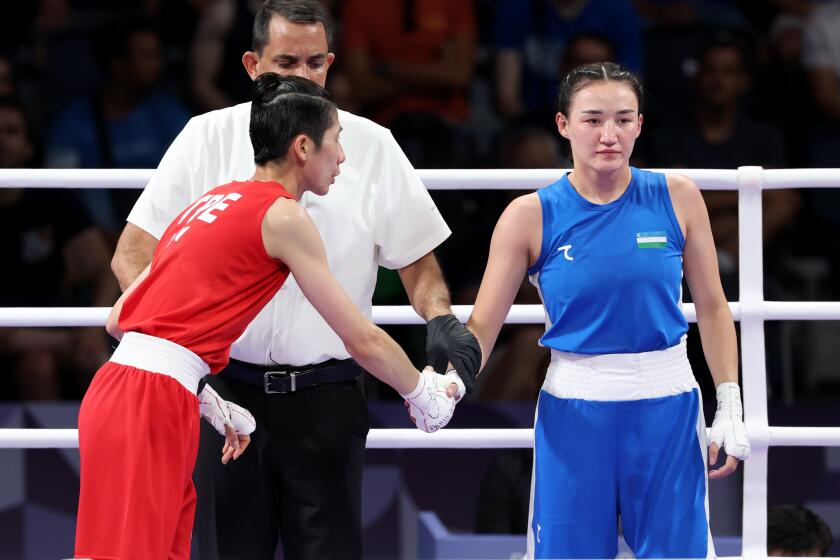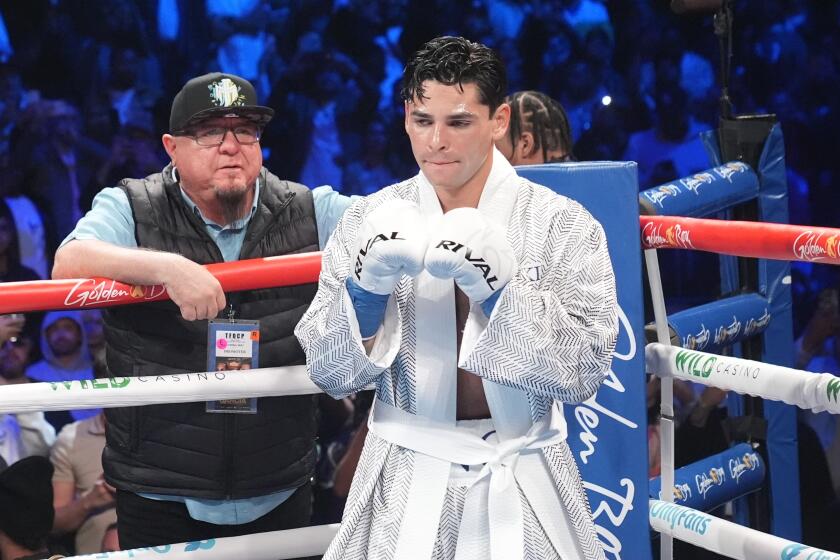Column: There’s a no-duh reason — think $$ — for Gennady Golovkin-Canelo Alvarez rematch
Ultimately, it was about the money. In boxing, it always is.
Or, as Floyd Mayweather once reminded a television audience, “I’m a prize fighter. That’s what I’m supposed to fight for, a prize. Duh.”
So, duh, of course Canelo Alvarez and Gennady Golovkin will be fighting again.
Chemically enhanced or not, the ever-popular Alvarez represented by far the most lucrative payday for the 36-year-old Golovkin. So on Wednesday, Golovkin agreed to terms for a Sept. 15 rematch of their draw from last year.
The outcome was predictable. In real time, there was legitimate uncertainty. The reason for that was Golovkin.
Golovkin didn’t speak publicly as his representatives negotiated the rematch with Alvarez, but he made comments this year that indicated he might not want anything to do again with the red-headed Mexican.
At issue were two drug tests Alvarez failed leading up to their originally scheduled rematch May 5, for which Golovkin’s share of the purse was increased to 35%. Alvarez blamed the clenbuterol in his system on contaminated meat he consumed in his home country. Golovkin didn’t buy it, calling Alvarez a cheater and accusing him of knowingly using performance-enhancing substances. Alvarez was suspended and the fight was called off.
Golovkin’s anger still hadn’t subsided in the days leading up to his fight against late replacement Vanes Martirosyan. Asked by Lance Pugmire of The Times why he would take a relatively low-paying fight that could jeopardize a more lucrative showdown with Alvarez in the future, Golovkin said through an interpreter, “Maybe you should change your frame of mind in thinking about money. Money is not the most important thing.”
The statement became relevant after Golovkin stopped an overmatched Martirosyan and his representatives opened talks with Alvarez’s promoters about a potential fight in September.
Golovkin’s side wanted a 50-50 split of the purse. Promoter Tom Loeffler said the demand was made by Golovkin himself and characterized it as part of a principled stand being taken by the fighter.
Alvarez was widely viewed as the loser of the first fight. Alvarez failed the drug tests that scrapped the second. In Golovkin’s demand was a veiled threat: If Alvarez wanted to fight someone else and remain burdened for the remainder of his career with a severely damaged reputation, he could. Money wasn’t of primary importance to Golovkin, certainly not something that by itself would make him want to bail out Alvarez.
But was Golovkin really willing to walk away from such a huge payday? He was nearing the end of his career. He received only a $1-million guarantee for his fight against Martirosyan, whereas a rematch with Alvarez promised him tens of millions of dollars. He couldn’t be blamed for wanting to be compensated for the inherent dangers he faced each time in the ring.
As well known as he has become as a fighter, Golovkin remains a mystery as a person. A native of Kazakhstan, he has learned to speak English, but not well enough to convey his innermost thoughts.
The possibility existed that money really wasn’t the be-all-end-all for him, similar to how it wasn’t for Shohei Ohtani of Japan. Ohtani could have signed for more than $200 million if he had remained in Japan for two more years and come to the major leagues as a free agent. He instead received a $2-million bonus and minor league contract to start playing for the Angels this year. In Ohtani’s heart, the opportunity to measure himself against the best players in the world was worth more than $200 million.
Alvarez’s side didn’t flinch. And when Alvarez’s representatives at Golden Boy Promotions threatened to explore other options, Golovkin backed down from his demand. Golovkin said he would take 45% of the purse; Alvarez’s promoters countered at 42.5% and set a noon Wednesday deadline for Golovkin to accept.
Golovkin initially rejected the ultimatum, but the deal was somehow salvaged. Details of the agreement weren’t disclosed.
The clear winner here was Alvarez. In any other sport, he would be diminished by his designation as a drug cheat. Only this isn’t any other sport. The cancellation of his lucrative rematch with Golovkin turned out to be a postponement, and Alvarez will collect the larger paycheck. And with Alvarez enrolling in a voluntary drug-testing program last month, a victory here will likely erase any stain associated with his name.
His promoters deserve credit. If Oscar De La Hoya is the face of Golden Boy Promotions, president Eric Gomez is the brain. A few weeks ago, Gomez pushed back against the idea that Alvarez should concede half of the total purse for the opportunity to rehabilitate his image.
“You’re entitled to your opinion,” Gomez said at the time, “but it’s not going to happen.”
What Gomez already knew was that it didn’t have to happen.
The fight would still be made. There was too much money involved for it not to be.
Duh.
Follow Dylan Hernandez on Twitter @dylanohernandez
More to Read
Go beyond the scoreboard
Get the latest on L.A.'s teams in the daily Sports Report newsletter.
You may occasionally receive promotional content from the Los Angeles Times.











